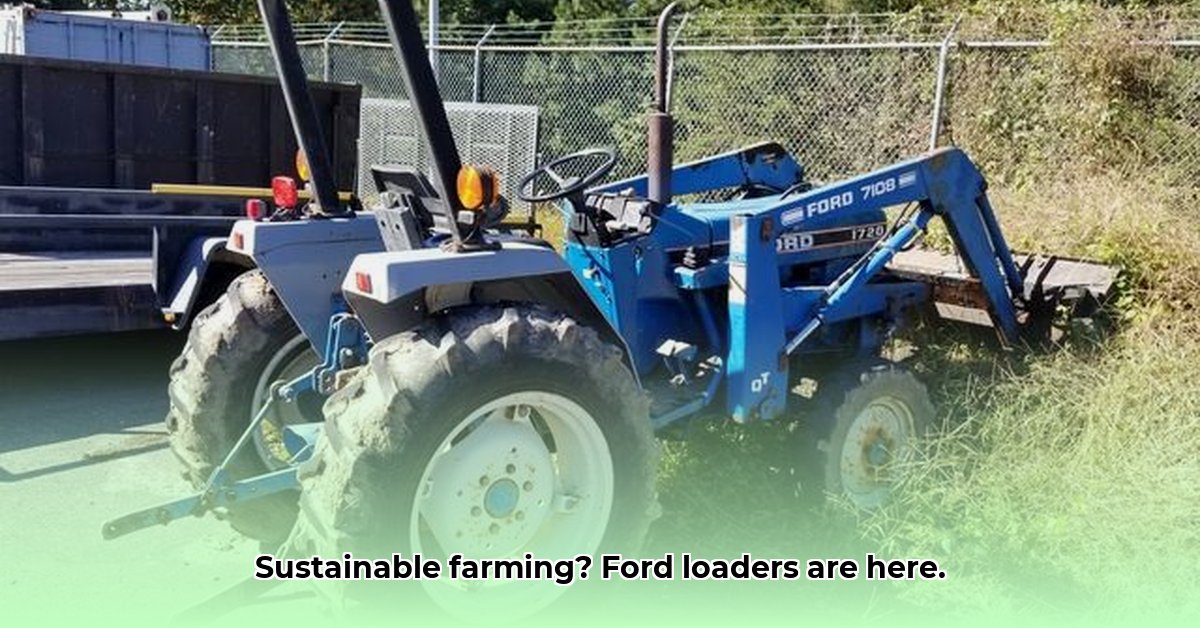
Old Bess, a trusty Ford loader tractor, coughed to life, its familiar sound a comforting rhythm for farmer Jed. Inherited from his father, Bess has tilled countless acres. Jed's story isn't unique; these workhorses continue to serve across farms, reflecting both Ford's legacy and farmers' pragmatic choices. But with growing emphasis on sustainable agriculture, can these older machines keep pace? This article explores the complex interplay between affordability and environmental responsibility in the context of used Ford tractors. For more on different tractor types, see this helpful resource: Tractor Types.
Ford's Impact on Agriculture: More Than Just a Machine
Ford tractors weren't merely technological advancements; they revolutionized agriculture. Innovations like power hydraulics (systems using hydraulic fluid to power implements) and three-point hitches (a system for attaching implements to the tractor) – now standard features – were pioneered by Ford, dramatically improving efficiency and ease of use. Decades later, their robust designs continue to serve, explaining the enduring appeal of used models.
The Price is Right: Affordability for the Small Farmer
New farm equipment is prohibitively expensive. For many small farmers, used Ford loader tractors offer a lifeline. They provide a reliable alternative at a fraction of the cost of new equipment, making farming a realistic possibility for those with limited budgets. This affordability is a key driver of their continuing popularity.
Reliability: A Strength, But Maintenance Matters
Older Ford tractors are renowned for their durability, built to withstand years of arduous farm work. However, even the most resilient machine needs care. Maintaining an older Ford presents challenges: sourcing replacement parts can be time-consuming and costly. Careful consideration of ongoing maintenance demands is crucial before purchasing.
The Sustainability Conundrum: Balancing the Budget with the Planet
This is where the complexity arises. While used Ford tractors offer cost-effectiveness and robust performance, they present a sustainability paradox. Older tractors often have lower fuel efficiency and higher emissions than newer models. This creates a direct conflict between economic necessity and environmental responsibility.
Environmental Impact: The Carbon Footprint of Tradition
Older Ford tractors have a significant environmental impact. Their lower fuel efficiency leads to increased fuel consumption and higher greenhouse gas emissions, lacking the advanced emission-control systems of newer models. This is a critical factor for farmers under increasing pressure to reduce their carbon footprint. Isn't it ironic that the very machines that enabled modern agriculture now present a significant environmental challenge?
Working Towards Sustainable Farming with Older Tractors: Actionable Steps
Addressing the sustainability challenge requires a multifaceted approach.
- Prioritize Preventative Maintenance: Regular maintenance, including timely oil changes and inspections, extends the lifespan and minimizes costly repairs.
- Secure Reliable Parts Sources: Establishing relationships with reliable parts suppliers ensures timely repairs. Exploring remanufactured parts is a cost-effective and environmentally conscious choice.
- Explore Fuel Efficiency Enhancements: Investigate potential aftermarket upgrades to improve fuel efficiency and reduce emissions. This often involves a cost-benefit assessment, balancing initial investment with long-term savings.
- Plan for the Future: While extending the lifespan of an older tractor is possible, a plan for transition to more sustainable equipment is a responsible long-term strategy.
What are the Risks? And How Can We Mitigate Them?
Using older tractors involves risks:
| Factor | Probability | Impact | Mitigation |
|---|---|---|---|
| Parts Availability | Moderate | High | Build relationships with suppliers; explore remanufactured parts; maintain a stock of common parts. |
| Maintenance Complexity | High | Moderate | Invest in training; meticulously document maintenance; consider hiring a qualified mechanic. |
| Environmental Impact | High | High | Explore upgrades; consider alternative fuels (where feasible); support sustainable farming practices. |
| Economic Viability | Moderate | High | Seek government subsidies; explore financing options for newer equipment. |
The Changing Regulatory Landscape
Stricter emission regulations are emerging globally, potentially making it increasingly difficult and expensive to operate older tractors in the coming years. Farmers must adapt, possibly through equipment upgrades, alternative fuels, or planned retirement of older machinery. This shift requires proactive planning and careful consideration of upcoming legislation.
Looking Ahead: A Balanced Perspective
Ford loader tractors have been indispensable to modern agriculture, offering affordability and reliability. However, sustainable farming demands a shift toward more fuel-efficient and lower-emission equipment. The challenge is finding solutions that balance economic needs with environmental responsibility—a challenge requiring innovation and collaboration.
How to Reduce Environmental Impact of Using Older Ford Tractors: Key Takeaways
- Older Ford tractors offer significant cost advantages but present clear environmental challenges.
- Improving fuel efficiency and minimizing idle time are crucial short-term strategies.
- Long-term solutions include transitioning to newer models, exploring alternative fuels, and adopting precision agriculture techniques for better optimization of resources.
- Regular, preventative maintenance is essential to maximize lifespan and minimize emissions.
- Government policies and technological advancements will play a significant role in shaping the future of sustainable farming practices.